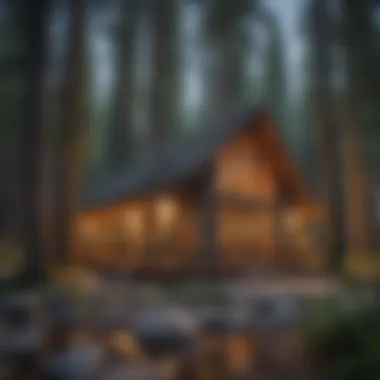Stone Creek Lodge: Sustainable Hospitality in Nature


Intro
The Stone Creek Lodge in Sequoia National Park represents an emerging model in sustainable hospitality. Its construction and operational practices reflect a commitment to ecological integrity and community engagement. In an age where environmental concerns shape consumer behaviors, this lodge stands as a beacon for eco-conscious travelers seeking solace in nature without leaving a detrimental impact on the environment. Understanding the interplay between hospitality and environmental stewardship is crucial as society grapples with sustainable development. This article will outline key aspects of the lodge's efforts, including architectural design and community impact while providing essential insights into local ecosystems.
Overview of Forestry Practices
Forestry practices play a critical role in maintaining ecosystem balance and sustainability.
Definition of Forestry
Forestry encompasses the science and art of managing forests, trees, and related resources. This includes cultivation, conservation, and the use of forest land to meet various needs such as wood production, recreation, and biodiversity conservation.
Importance of Forestry in Ecosystem Management
Proper forestry practices are vital for:
- Biodiversity Conservation: Healthy forests support numerous species.
- Climate Regulation: Forests act as carbon sinks, helping to mitigate climate change.
- Watershed Protection: Forests improve water quality and regulate hydrological cycles.
- Economic Value: Sustainable forestry can provide jobs and economic stability for local communities.
Sustainable Forest Management
Sustainable forest management (SFM) ensures that forest resources are used wisely, balancing ecological needs and human demands.
Principles of Sustainable Practices
The core principles of sustainable forest management include:
- Maintaining the diversity of forest ecosystems.
- Ensuring the continued regeneration of forest resources.
- Engaging local communities in the decision-making process.
Techniques in Sustainable Management
Techniques for realizing sustainable management include:
- Selective logging methods to minimize habitat disruption.
- Reforestation and afforestation initiatives to replace harvested areas.
- Monitoring forest health to prevent disease outbreaks and pest invasions.
Woodland Stewardship Strategies
Woodland stewardship is essential for the long-term health of forest ecosystems.
Importance of Woodland Stewardship
Practicing effective stewardship ensures sustainable use of woodland resources and enhances the landscape’s ecological integrity.
Best Practices for Landowners
Landowners can adapt these best practices for maintaining their forested areas:
- Regularly assess woodland health and biodiversity.
- Engage with local conservation groups for support and resources.
- Adopt responsible hunting and recreational practices to avoid disturbances.
"Successful management of forests requires integrating sustainability practices that not only benefit the land but also engage and empower the local communities dependent on it."
Understanding and implementing the aforementioned strategies will aid Stone Creek Lodge and similar establishments in navigating the complex relationship between hospitality and the environment. This establishes pathways towards a greener future where hospitality aligns with conservation efforts.
Prologue to Stone Creek Lodge
The Stone Creek Lodge serves as an exemplary model of sustainable hospitality amidst the stunning backdrop of Sequoia National Park. Understanding its significance helps to appreciate the complexities of integrating hospitality with environmental stewardship. The importance of this lodge lies not only in its architectural design but also in its commitment to sustainability and community engagement. These elements together create a unique space for eco-conscious travelers seeking an immersive nature experience.
The lodge's initiatives promote a harmony between guests and the surrounding ecosystem, making it a focal point for discussions around sustainable tourism. It also acts as a bridge between luxury and ecological responsibility, showing that indulgence does not have to come at the expense of nature. This section will explore the lodge's historical background and location, shedding light on how both have contributed to its current standing as a hub for sustainable practices.


Historical Background
The historical background of Stone Creek Lodge offers insights into how the structure and its operations evolved in response to changing environmental and social dynamics. Initially, the lodge was developed as a recreational retreat, showcasing the natural beauty of the local landscape. Over the years, it has adapted to embrace a stronger commitment to sustainability, responding to growing concerns about climate change and ecological degradation.
In its early years, the focus was primarily on providing visitors with comfort and convenience. However, as awareness of environmental issues increased, the management recognized the need for a more responsible approach. This shift marked the beginning of the lodge's journey towards integrating sustainable practices into its core operations, thus acknowledging its role in protecting the surrounding ecosystem.
Location and Accessibility
Strategically located within Sequoia National Park, Stone Creek Lodge provides easy access to breathtaking natural wonders. Its proximity to significant landmarks such as the Giant Forest and Mt. Whitney enhances its appeal. Visitors can engage in a range of outdoor activities, from hiking to wildlife observation, making it a prime destination for those seeking adventure in nature.
Accessibility also plays a crucial role in its success. The lodge can be reached via well-maintained roads that connect to major highways, which aids in attracting a diverse range of guests. However, it is vital to maintain responsible visitation practices to preserve the area’s pristine condition. The lodge encourages guests to explore sustainably, promoting activities that minimize impact on the fragile environment.
Architectural Design Features
Architectural design features significantly contribute to the overall ethos of Stone Creek Lodge. The focus here is on creating a sustainable atmosphere that not only enhances the experience of guests but also respects the natural environment. Effective design can reduce energy consumption, promote well-being, and ensure comfort. The integration of eco-friendly concepts throughout the architecture makes the lodge a model for sustainable hospitality.
Eco-Friendly Materials
The choice of materials is fundamental in the construction of Stone Creek Lodge. By prioritizing eco-friendly materials, the lodge sets a precedent in the hospitality industry. Materials such as reclaimed wood and recycled metals have been used thoughtfully throughout the structure. These materials reduce waste and lower the carbon footprint associated with building new materials from raw sources.
Energy-efficient windows and sustainable insulation also play a crucial role. They minimize heat loss and enhance energy efficiency. The use of non-toxic finishes and paints further ensures the indoor air quality is safe for guests and staff alike. This careful selection process highlights a commitment to sustainability and health, aligning with the lodge's mission of environmental stewardship.
Integration with Surrounding Environment
The architectural design of Stone Creek Lodge does not just stop at materials; it extends to how the structure blends with the surrounding environment. The lodge's layout is designed to maximize views of the stunning landscape without interrupting the natural habitat. The placement of the building takes into account the surrounding flora and fauna, ensuring minimal disruption to local wildlife.
Natural landscaping around the lodge provides a seamless transition between indoors and outdoors. Indigenous plant species are used to restore the area and maintain biodiversity. This approach not only enhances the aesthetic appeal but also serves as a habitat for local wildlife. Additionally, the design incorporates features such as green roofs and permeable pavements to further reduce environmental impact and implement effective rainwater management.
"Sustainable architecture goes beyond aesthetics. It is about creating harmony between human structures and nature's beauty."
The strategic integration of architecture and landscape embodies a holistic approach. It ensures that Stone Creek Lodge is not just a place for rest but also a facilitator of sustainable practices that protect and celebrate its beautiful surroundings.
Sustainability Initiatives
Sustainability is a cornerstone of operations at Stone Creek Lodge in Sequoia National Park. Integrating sustainable practices is vital for hospitality businesses, especially in ecologically sensitive areas. This approach not only reduces environmental impact but also enhances the guest experience, aligning with the values of eco-conscious travelers. Stone Creek Lodge exemplifies how the hospitality sector can support ecological balance while providing memorable visits to nature enthusiasts.
Renewable Energy Sources
At Stone Creek Lodge, the commitment to renewable energy is prominent. The lodge harnesses solar energy as a primary source of power. Solar panels installed on the property convert sunlight into electricity, significantly reducing dependence on fossil fuels. This initiative serves multiple purposes: it minimizes greenhouse gas emissions and decreases operating costs, which can improve overall financial health.
In addition to solar energy, the lodge utilizes energy-efficient systems for heating and cooling. Each unit is fitted with modern technology designed to optimize energy use while maintaining comfort. These systems further decrease the carbon footprint of the lodge, making it a leading example in the sustainable hospitality landscape.
Water Conservation Strategies
Water conservation is another key area of focus at Stone Creek Lodge. Located in an area prone to seasonal fluctuations, the lodge recognizes the necessity of responsible water management. The implementation of low-flow fixtures in bathrooms and kitchens significantly reduces water consumption without sacrificing guest comfort. These measures can lead to an estimated 30 percent reduction in water use.
Furthermore, rainwater harvesting systems are installed to supplement water supply for landscaping irrigation. This practice not only reduces the strain on local water resources but also promotes the landscape's natural beauty. Educational programs for guests about the significance of water conservation increase awareness and participation in these initiatives.
Waste Management Practices
Effective waste management is critical at Stone Creek Lodge. The lodge has adopted a comprehensive recycling program that encourages guests and staff to separate recyclables, compost organic waste, and properly dispose of hazardous materials. An on-site composting system turns food waste into valuable compost for landscaping, enhancing soil health and reducing landfill contributions.
Regular training ensures that staff understand these practices and actively engage in them. Guest information on waste management is part of the check-in process, promoting community involvement in sustainable practices.
Impact on Local Ecosystem
The impact on the local ecosystem is crucial when evaluating the Stone Creek Lodge's role in sustainable hospitality. Understanding how lodge operations align with ecological well-being enhances the appreciation of its existence. The integration of eco-conscious practices not only benefits the immediate surroundings but also serves as a model for future initiatives throughout the region.
Biodiversity Considerations


Biodiversity is a cornerstone of ecosystem health. The lodge is strategically positioned within Sequoia National Park, an area renowned for its rich variety of flora and fauna. This proximity fosters an environment where conservation efforts can thrive. The lodge actively promotes biodiversity through several methods:
- Native Plant Landscaping: The grounds are landscaped with endemic species, reducing the need for irrigation and maintenance while supporting local wildlife.
- Wildlife Observation Initiatives: Guests are encouraged to engage in wildlife watching, fostering a connection to nature and stressing the importance of preserving habitats.
- Educational Programs: Informative sessions educate guests on local ecosystems and the species they harbor, enhancing awareness and stewardship.
These initiatives not only enrich the guest experience but also contribute significantly to the sustainablity of the area.
Habitat Preservation Efforts
Habitat preservation is a primary focus for maintaining the delicate balance of local ecosystems. Stone Creek Lodge engages in several preservation practices to safeguard the surrounding natural environments. Notable efforts include:
- Support for Conservation Projects: The lodge collaborates with local organizations dedicated to the preservation of Sequoia's landscape and habitats.
- Responsible Tourism Practices: By promoting ethical travel, the lodge minimizes environmental footprints, ensuring minimal disturbance to wildlife and plants.
- Incentives for Eco-friendly Behavior: The lodge incentivizes guests to partake in activities that support habitat restoration, such as participating in clean-up initiatives.
As a result of these efforts, the lodge not only provides a comfortable retreat for visitors but also acts as a guardian for the future health of the local ecosystem.
"The true measure of hospitality is not merely in services offered but also in the respect afforded to the environment it inhabits."
Through these focused actions, the Stone Creek Lodge exemplifies how hospitality can coexist with environmental stewardship, highlighting the importance of safeguarding natural resources for future generations.
Guest Experience and Activities
Understanding the guest experience at Stone Creek Lodge is essential. This section highlights how the interaction of hospitality and nature shapes a memorable visitor stay. By focusing on specific elements such as recreational activities and educational programs, Stone Creek Lodge not only offers lodging but also fosters an environment conducive to learning and connection with nature. Each activity is designed to enhance appreciation for the local ecosystem, making the guest experience inherently rewarding.
Nature-Based Recreational Activities
Nature-based recreational activities are a core aspect of the guest experience at Stone Creek Lodge. These activities promote engagement with the Sequoia National Park's stunning environment. Hiking, for example, allows guests to explore scenic trails. They can witness towering sequoias and vast biodiversity firsthand. Bird-watching is another enjoyable activity. The park shelters various bird species, appealing to both amateur and expert birders.
Cycling is also an option, offering guests a chance to navigate through the different landscapes while soaking in the natural beauty. These activities do not just provide enjoyment; they also create awareness about conservation. By engaging with their surroundings, guests develop a sense of responsibility towards protecting the environment.
Additionally, guided tours are available. These tours can cover various subjects, from the geological formation of the park to the significance of its flora and fauna. Through these guided experiences, visitors gain insights that deepen their connection with nature and increase the overall experience.
Education and Awareness Programs
Education and awareness programs at Stone Creek Lodge serve to inform guests about sustainability and environmental stewardship. These programs aim to enhance understanding of ecological practices and the importance of conservation.
Such programs may include workshops on sustainable living. Guests can learn practical skills such as composting or wildlife-friendly gardening. Events that feature local experts discussing flora and fauna are also likely. These presentations provide a rich depth of knowledge, inviting guests to engage more thoughtfully with the ecosystem.
Moreover, the lodge may collaborate with local organizations to host youth programs. These programs could focus on the necessity of preserving nature for future generations. As a result, participants leave with a comprehensive understanding of environmental issues and the importance of their contributions.
Education at Stone Creek Lodge extends beyond formal programs. Casual conversations with staff and other guests often lead to enlightening exchanges about experiences in nature. This creates a shared learning atmosphere, encouraging greater interaction and inspiring a collective effort towards sustainability.
"The intersection of hospitality and education at Stone Creek Lodge not only benefits guests but also the environment they engage with."
In summary, the guest experience at Stone Creek Lodge is intimately tied to nature-based activities and educational programs. This powerful combination enriches visitors’ understanding while fostering a commitment to protecting these valuable ecosystems.
Community Engagement and Collaboration
Community engagement and collaboration are vital components of the operational framework at Stone Creek Lodge. These elements not only bolster the lodge's commitment to sustainable hospitality but also strengthen ties with local residents and businesses. In an era where ecological awareness is increasingly paramount, engaging with the community ensures that the lodge’s operations align with the interests and needs of the surrounding area.
A collaborative approach helps to integrate local traditions and practices into the skill set of lodge staff and experiences offered to guests. It fosters a sense of ownership among community members, which can lead to more effective conservation strategies and enhances local identity.
In summary, by prioritizing community engagement, Stone Creek Lodge not only positions itself as a responsible steward of nature but also as a cultural hub that respects and uplifts its local surroundings.
Local Partnerships
Local partnerships are essential for the sustainable ecosystem that Stone Creek Lodge aims to create. Forming alliances with nearby businesses, non-profits, and local government allows the lodge to leverage shared resources, knowledge, and networks.
For instance, collaborations with local craftsmen and artisans help showcase indigenous art and traditions. There is a growing trend for visitors who seek authentic experiences, and supporting local artists adds value to their stay. Furthermore, partnerships with area schools enhance educational programs offered at the lodge, creating mutually beneficial opportunities that enrich both visitor experience and local education.


These partnerships also extend to agricultural producers. Sourcing food from local farms not only reduces carbon footprint associated with transportation but also supports local economies. It emboldens small-scale farmers and fosters relationships that can enhance biodiversity and soil health in the region.
Contributions to Local Economy
The contributions of Stone Creek Lodge to the local economy cannot be overstated. By focusing on sustainable practices, the lodge generates job opportunities that prioritize environmental stewardship. Employment at the lodge often extends beyond typical hospitality roles. It includes positions in ecological management, education, and community outreach, which are critical as eco-conscious tourism continues to grow.
The economic benefits also extend to surrounding businesses. As guests frequent local shops and restaurants when they stay at Stone Creek Lodge, an influx of visitors translates to increased revenue for these establishments. This symbiotic relationship supports the local economy while ensuring that the lodge can maintain its sustainable practices.
"Investing in local economies nurtures not only the community but also the foundation of responsible tourism."
Regulatory Framework
Understanding the regulatory framework surrounding Stone Creek Lodge is essential for comprehending how sustainable hospitality operates in a natural environment. This framework not only ensures that the operations of the lodge align with established environmental standards, but also serves to protect the delicate ecosystem of Sequoia National Park. Through regulations, the lodge can maintain its commitment to sustainability while offering a welcoming experience to guests.
Environmental Regulations
Environmental regulations play a pivotal role in guiding the operations of Stone Creek Lodge. These rules are designed to minimize the environmental impact of hospitality establishments, particularly in ecologically sensitive regions like Sequoia National Park. Legislation such as the National Environmental Policy Act mandates thorough assessments of any proposed projects that may affect the surrounding environment. This involves evaluating potential impacts on air and water quality, wildlife habitats, and natural resources.
Specifically, the lodge adheres to a set of local, state, and federal guidelines to ensure compliance. These guidelines cover areas such as resource management and pollution control. For instance, specific limitations on waste disposal methods prevent the contamination of soil and water. Furthermore, noise regulations help maintain the tranquility of the park, preserving the natural soundscape. The lodge actively engages with regulatory agencies to stay updated with changes in the law, ensuring that its practices align with current standards.
Compliance and Certification
Compliance with environmental regulations is crucial for Stone Creek Lodge. Achieving certification from recognized environmental organizations is a testament to the lodge's commitment to sustainability. Certifications, such as the Green Key Eco-Rating Program, evaluate several areas of operation, including energy efficiency, waste reduction, and water conservation.
Certification offers tangible benefits to the lodge, including enhanced reputation and trust among eco-conscious travelers. It also serves to motivate the lodge to consistently improve its practices. Regular audits are conducted to assess compliance with environmental standards. These evaluations not only reveal areas needing improvement but also reinforce successful initiatives. For instance, waste diversion rates and energy consumption patterns are meticulously tracked, providing a clear picture of the lodge's overall environmental impact.
Ultimately, the regulatory framework shapes the operational standards of Stone Creek Lodge, fostering an environment where sustainable practices can thrive. By adhering to these regulations and obtaining necessary certifications, the lodge contributes positively to the surrounding ecosystem while providing a high-quality guest experience.
Future Challenges and Opportunities
The landscape of sustainable hospitality is ever-evolving, presenting both challenges and opportunities. For Stone Creek Lodge, these elements are crucial for maintaining its position as a leader in eco-conscious tourism. Recognizing the potential hurdles while also embracing the possibilities allows the lodge to navigate its commitment to sustainability effectively. Adapting to changes in environmental policies, technological advancements, and guest expectations is imperative for the long-term viability of the lodge and similar establishments.
Climate Change Impacts
The effects of climate change significantly influence the operations at Stone Creek Lodge. Rising temperatures can alter ecosystems, including flora and fauna, which directly impacts recreational activities available to guests. For instance, the health of Sequoia trees is essential for attracting visitors. As these trees face threats from higher temperatures and more frequent wildfires, the lodge must take proactive measures to adapt. Furthermore, unpredictable weather patterns may affect the lodge’s energy efficiency and water supply, crucial components of their sustainability strategy. Mitigation strategies must prioritize minimizing the operational footprint while enhancing resilience against these changes. The lodge may look into innovative technologies for energy and water management to counteract climate risks and ensure a sustainable future.
Adapting Sustainable Practices
In light of the evolving environmental landscape, Stone Creek Lodge must continually adapt its sustainable practices. This can involve reviewing and updating policies regarding waste management and resource consumption. Implementing sustainable sourcing for materials and food can play a significant role in reducing environmental impact. For instance, collaborating with local farmers can not only lessen carbon footprints but also enrich guest experiences by providing fresh, regional dishes.
Moreover, education initiatives are essential. Training staff and informing guests about sustainable best practices can enhance overall awareness and engagement with the environment. From promoting carpooling to increasing composting efforts, every small change contributes to a larger, positive impact. As consumer preferences shift towards more sustainable options, adapting to these demands helps the lodge stay relevant and competitive in the hospitality market.
"Embracing opportunity often means adapting to challenges with resilience and foresight."
In summary, the strategies Stone Creek Lodge implements will set the stage for its future, reinforcing its dedication to sustainability and community engagement while responding to the pressing realities of climate change.
Epilogue
The conclusion encapsulates the essence of the journey undertaken in this exploration of Stone Creek Lodge. It illustrates how sustainable hospitality in the heart of nature is not merely a trend, but a pivotal necessity for the future of the hospitality industry. The unique integration of environmental responsibility with guest experiences at Stone Creek Lodge showcases a model that can influence other establishments.
Summary of Key Insights
- Sustainable Practices: Stone Creek Lodge adopts numerous eco-friendly practices. These range from utilizing renewable energy sources to implementing effective water conservation strategies. Such efforts minimize the lodge's carbon footprint and promote responsible tourism.
- Community Engagement: The lodge's collaboration with local communities highlights its commitment to sustainable development. This partnership not only enriches guest experiences but also boosts the local economy. By sourcing produce and services locally, the lodge helps ensure that tourism benefits those who live in the surrounding areas.
- Educational Focus: Through education and awareness programs, visitors gain valuable insights into the local ecosystem. This approach fosters a deeper respect for nature and encourages eco-conscious choices during their stay and beyond.
"Sustainable hospitality is an invitation to travelers to connect with their environment in meaningful ways."
- Regulatory Compliance: Understanding and adhering to environmental regulations enhances the lodge's credibility. Compliance with certification standards creates a framework that guides operations and ensures ongoing improvements in sustainability.
The Path Forward for Stone Creek Lodge
Looking ahead, Stone Creek Lodge must remain vigilant about adapting to the challenges posed by climate change. This includes:
- Incorporating Adaptation Strategies: It is crucial for the lodge to continuously adapt its practices in light of emerging environmental research. Implementing cutting-edge technologies and methodologies can lead to further enhancements in sustainability.
- Expanding Educational Programs: There is potential for expanding educational offerings. Engaging guests more thoroughly through workshops or guided activities could amplify awareness and appreciation.
- Strengthening Community Ties: Enhancing partnerships with local communities can further enrich guest experiences while reinforcing the lodge's commitment to mutual growth.
In summary, the path ahead for Stone Creek Lodge is filled with opportunities. The continued focus on sustainable initiatives not only strengthens its position as a leader in eco-conscious hospitality but also sets a precedent for others in the industry.







